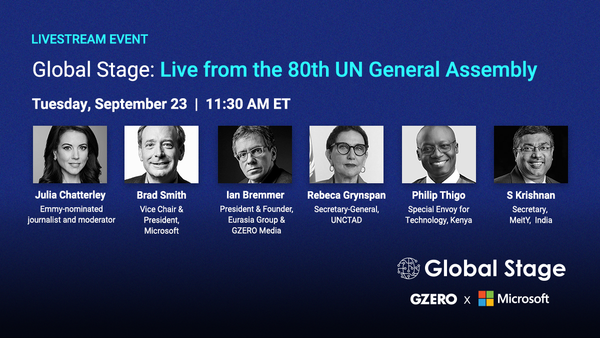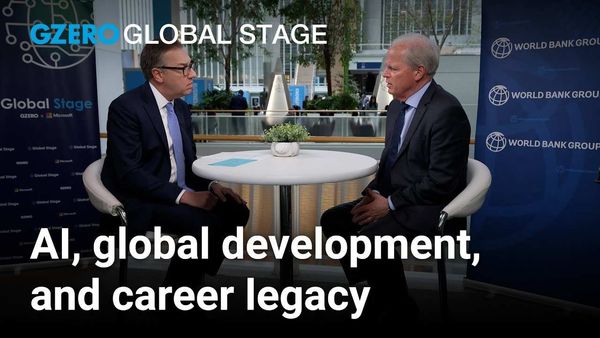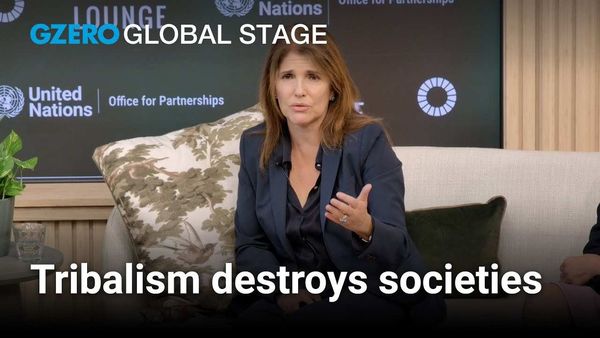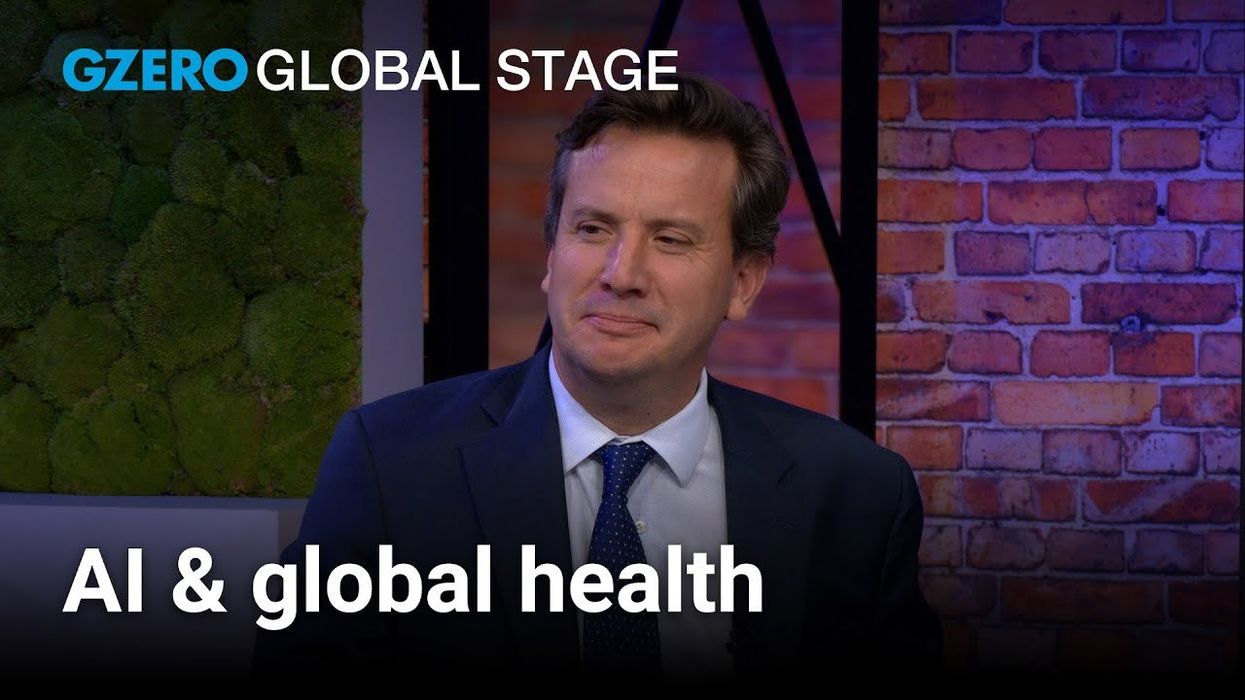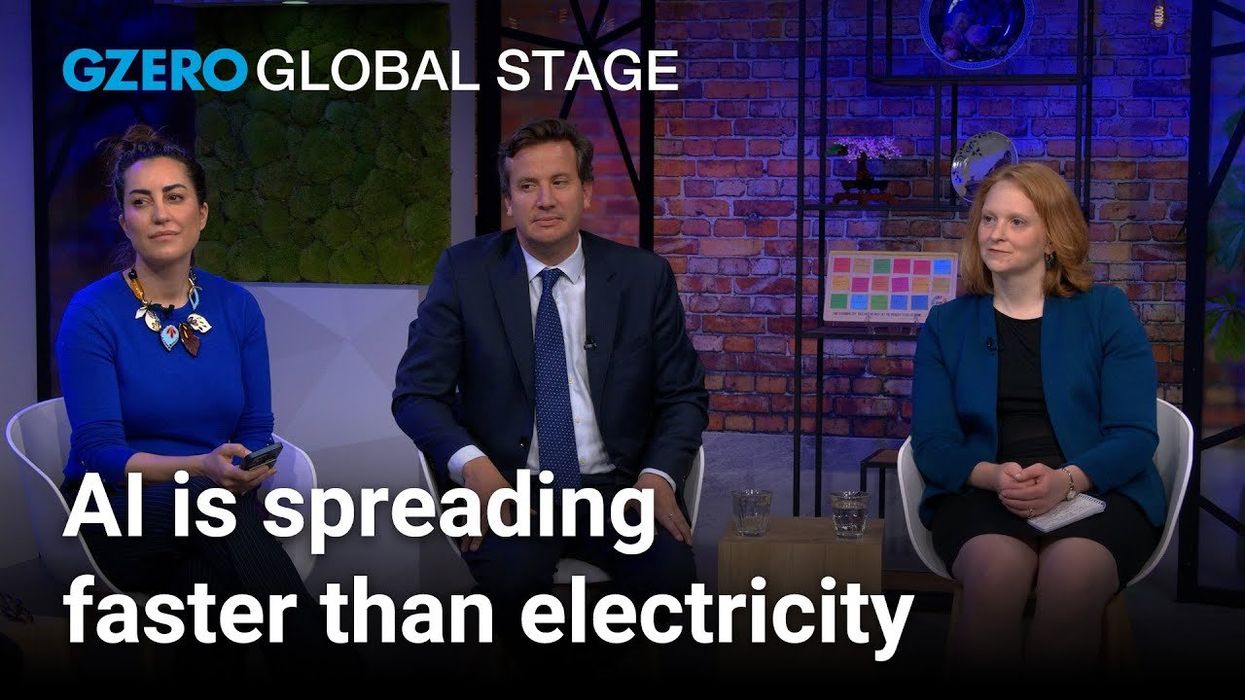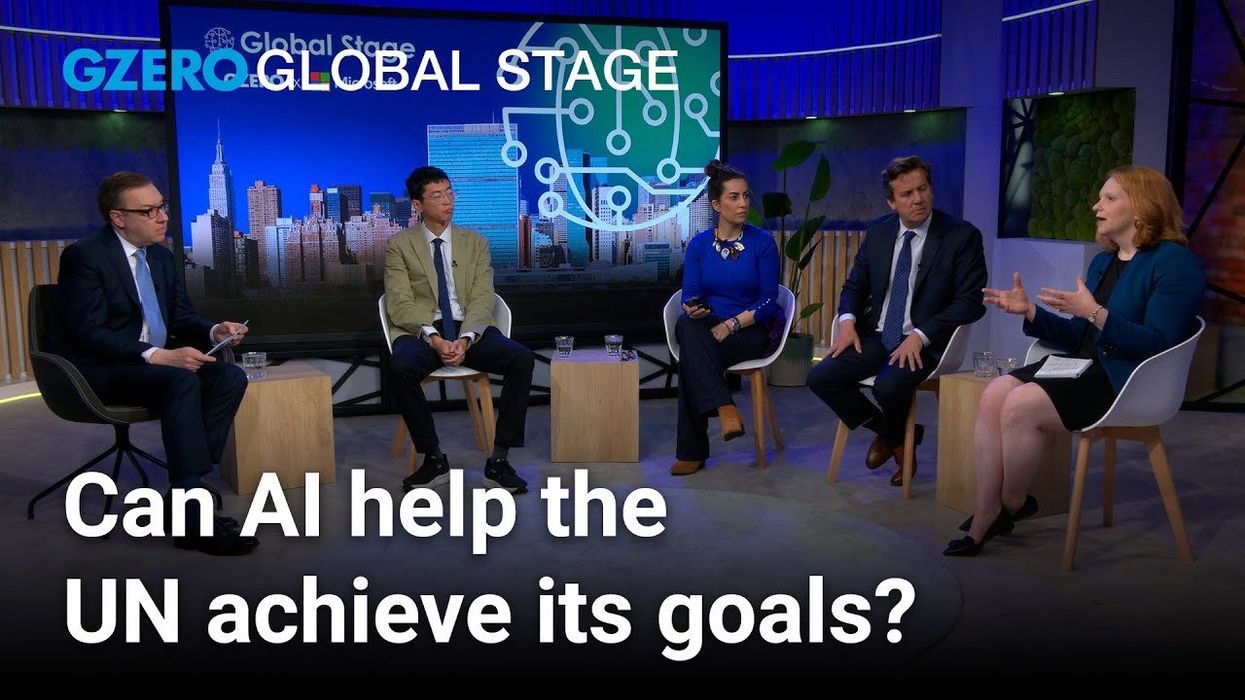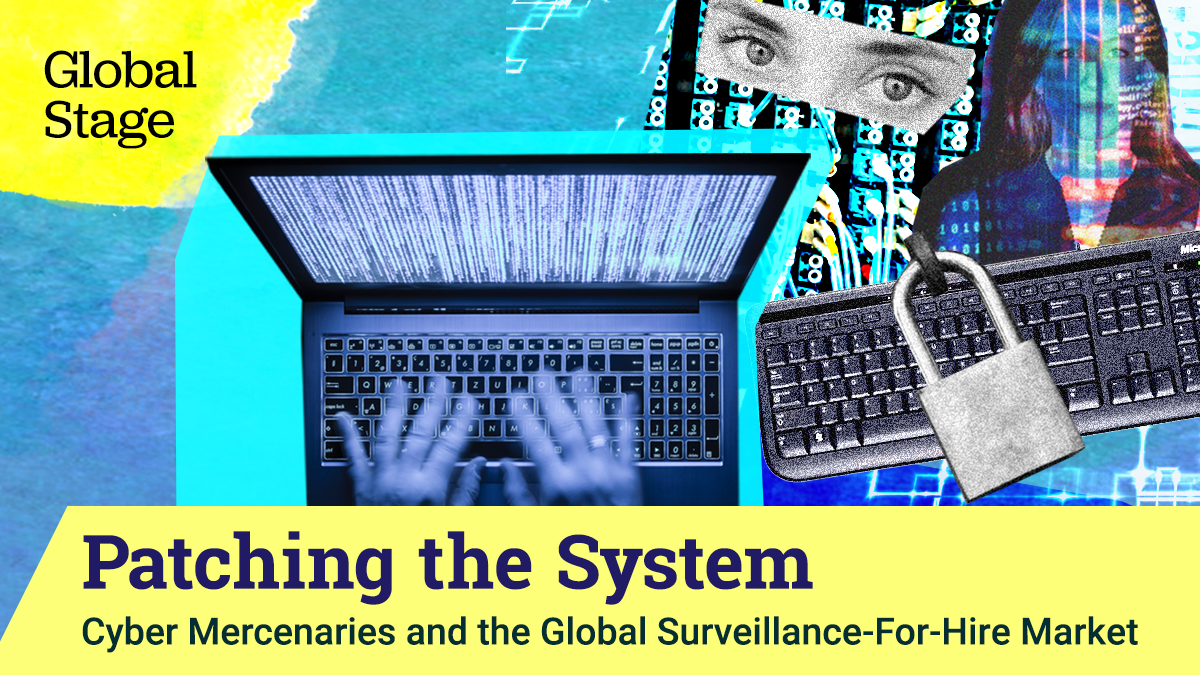
Listen: The use of mercenaries is nothing new in kinetic warfare, but they are becoming a growing threat in cyberspace as well. The weapon of choice for cyber mercenaries is malicious spyware that undermines otherwise benign technologies and can be sold for profit. Luckily, awareness about this threat is also growing, and increasing global coordination efforts are being put forth to combat this dangerous trend.
In episode 2, season 2 of Patching the System, we're focusing on the international system of bringing peace and security online. In this episode, we look at what governments and private enterprises are doing to combat the growth of the cyber mercenary industry.
Our participants are:
- Eric Wenger, senior Director for Technology Policy at Cisco
- Stéphane Duguin, CEO of the CyberPeace Institute
- Ali Wyne, Eurasia Group Senior Analyst (moderator)
GZERO’s special podcast series “Patching the System,” produced in partnership with Microsoft as part of the award-winning Global Stage series, highlights the work of the Cybersecurity Tech Accord, a public commitment from over 150 global technology companies dedicated to creating a safer cyber world for all of us.
Subscribe to the GZERO World Podcast on Apple Podcasts, Spotify, Stitcher, or your preferred podcast platform, to receive new episodes as soon as they're published.
TRANSCRIPT: Cyber mercenaries and the global surveillance-for-hire market
Disclosure: The opinions expressed by Eurasia Group analysts in this podcast episode are their own, and may differ from those of Microsoft and its affiliates.
Eric Wenger: There's no phishing or fooling of the user into installing something on their device. This technology is so powerful that it can overcome the defenses on a device. So this is a tool that is on the level of sophistication with a military grade weapon and needs to be treated that way.
Stéphane Duguin: What we're facing is a multifaceted threat with a loose network of individuals, financiers, and companies which are playing a link in between states when it comes to a deployment of these surveillance capabilities. So if you want to curb this kind of threats, you need to act as a network.
Ali Wyne: In the ongoing war in Ukraine, both sides have employed mercenaries to supplement and fortify their own armies. Now, guns for hire are nothing new in kinetic warfare, but in cyberspace, mercenaries exist as well to augment government capabilities and their weapon of choice is malicious spyware that undermines peaceful technology, and which can be sold for profit. Today we'll enter the world of cyber mercenaries and the work that's being done to stop them.
Welcome to Patching The System, a special podcast from the Global Stage series, a partnership between GZERO Media and Microsoft. I'm Ali Wyne, a senior analyst at Eurasia Group. Throughout this series, we're highlighting the work of the Cybersecurity Tech Accord, a public commitment from over 150 global technology companies dedicated to creating a safer cyber world for all of us. In this episode, we're looking at the latest in cyber mercenaries and what's being done to stop them. Last season we spoke to David Agranovich, director of Global Threat Disruption at Meta, about what exactly it is that cyber mercenaries do.
David Agranovich: These are private companies who are offering surveillance capabilities, which once were essentially the exclusive remit of nation state intelligence services, to any paying client. The global surveillance for hire industry, for example, targets people across the internet to collect intelligence, to try and manipulate them into revealing information about themselves and ultimately to try and compromise their devices, their accounts, steal their data.
Ali Wyne: And since then, awareness has grown and efforts to fight these groups have been fast tracked. In March of this year, the Tech Accord announced a set of principles specifically designed to curb the growth of the cyber mercenary market, which some estimate to be more than $12 billion globally. That same month, the White House issued an executive order to prohibit the U.S. government from using commercial spyware that could put national security at risk, an important piece of this cyber mercenary ecosystem.
On the other side of the Atlantic, a European Parliament committee finalized a report on the use of spyware on the continent and made recommendations for regulating it. And most recently, bipartisan legislation was introduced in the United States to prohibit assistance to foreign governments that use commercial spyware to target American citizens.
Are all of these coordinated efforts enough to stop the growth of this industry? Today I'm joined by Eric Wenger, senior Director for Technology Policy at Cisco, and Stéphane Duguin, CEO of the CyberPeace Institute. Welcome to you both.
Eric Wenger: Thank you.
Stéphane Duguin: Thank you.
Ali Wyne: Now, I mentioned this point briefly in the introduction, but I'd love to hear more from both of you about specific examples of what it is that cyber mercenaries are doing. What characterizes their work, especially from the latest threats that you've seen?
Stéphane Duguin: It's important maybe to start with a bit of definition of what are we talking about when we talk about cyber mercenaries. So interestingly, there is the official definition and what we all mean. Official definition - you can find this in the report to the general assembly of the United Nation, where it's really linked to private actors that can be engaged by states and non-state actors. It's really about the states taking action to engage someone, to contract someone in order to look into cyber operations in the context of an armed conflict.
I would argue that for this conversation, we need to look at the concept of cyber mercenaries wider and look at this as a network of individuals, of companies, of financial tools, of specific interest to at the end of the day, ensure global insecurity. Because all of this is about private sector entities providing their expertise, their time, their tool to governments to conduct clearly at scale an illegal, unethical surveillance. And to do this investment - money - needs to pour into a market, because it's a market which finances what? Global insecurity.
Eric Wenger: I would add that there's another layer to this problem that needs to be put into context, and that is, Stéphane correctly noted, that these are private sector entities and that their customers are governments that are engaged in some sort of activity that is couched in terms of protecting safety or national security. But the companies themselves are selling technology that is regulated and therefore is being licensed from a government as well too. I think that's really the fascinating dynamic here is that you have a private sector intermediary that is essentially involved in a transaction that is from one government to another government with that private sector actor in the middle being the creator of the technology, but it is subject to a license by one government for a sale to another government.
Ali Wyne: This market is obviously growing quickly, and I mentioned in my introductory remarks that $12 billion global figure, so obviously there's a lot of demand. From what you've seen, who are the customers and what's driving the growth of this industry?
Eric Wenger: Well, the concerning part of the story is that there have been a number of high profile incidents that have indicated these technologies are being used not just to protect against attacks on a nation, but in order to benefit the stability of a regime. And in that context, what you see are journalists being the subject of the use of these technologies or dissidents, human rights activists. And that's the part that really strikes me as being quite disturbing. And it is frankly the hardest part of this problem to get at because as I noted before, if you have these private sector actors that are essentially acting as intermediaries between governments, then it's hard to have a lot of visibility from the outside of this market into what are the justifications that are enabling sales. Who is this technology going to? How is it being used and how is it potentially being checked in order to address the human rights concerns that I've flagged here?
Ali Wyne: Stéphane, let me come back to you. So you used to work in law enforcement and given your law enforcement background, one question that one might ask is why shouldn't governments be taking advantage of cyber mercenaries if they are making tools that help to, for example, track down terrorists or otherwise fight crime and improve national defense? Why shouldn't governments be taking advantage of them?
Stéphane Duguin: Something that is quite magical about law enforcement, it's about enforcing the law. And in this case, there's clear infringement all over the place. Let's look into the use cases that we know about. So when it comes to law, what kind of judicial activities have been undertaken after the use, sale or export of these kinds of tools? So there's this company, Amesys, which is now sued for complicity in acts of torture, over sales of surveillance technologies to Libya. You have these cases of dissident that has been arrested in Egypt in the context of the acquisition of the Predator tool. More recently we've seen what happened in Greece with this investigation around the surveillance of critics and opponents. And you can add an add on example. This has nothing to do with law enforcement.
So my experience in law enforcement is that you have a case, when you have a case, you have an oversight, a judicial oversight. I was lucky to work in law enforcement in Europe, so a democratic construct that goes under the oversight of parliament. Where is this construct where a private sector entity has free rein to research and develop, increase, export, exactly as was said before, in between state, a technology, which by the way is creating expertise within that same company for people that are going to sell this expertise left and right. Where is the oversight? And where are the rules that would put this into a normal law enforcement system?
And just to finish on this, I worked on investigating terrorist group and cyber gangs most of my career, and we can do cases, we can do very, very, very good cases. I would not admittedly say that the problem is about putting everyone under surveillance. The problem is more about investing resources in law enforcement and in the judicial system to make sure that when there's a case, there's accountability and redress and repair for victims. And these, do not need surveillance at scale.
Ali Wyne: Eric, Let me come back to you. So, I want to give folks who are listening, I want to give them a little bit of a sense of the size of the problem and to help put the size of the problem in perspective. So when we talk about cyber mercenaries, just how big is the threat from them and the organizations for which they work? And is that threat, is it just an annoyance or is it a real cause for concern? And who's most affected by the actions that they take?
Eric Wenger: We could talk about the size of the market and who is impacted by it. That's certainly part of the equation in trying to size the threat. But we also have to have a baseline understanding of what the technology is that we're talking about in order for people to appreciate why there's so much concern. And we're talking about exploits that can be sent from the deployer or the technology to a mobile device that's used by an individual or an organization without any action being taken by the user. There's nothing you have to click, there's nothing you have to accept. There's no phishing or fooling of the user into installing something on their device. This technology is so powerful that it can overcome the defenses on a device. And then that device is then completely compromised so that cameras can be turned on, files stored on the device can be accessed, microphones can be activated.
So this is a tool that is on the level of sophistication with a military grade weapon and needs to be treated that way. So the concern is the cutout of a private sector entity in between the government, and these are typically democratic governments that are licensing these technologies to other governments that wouldn't have the capabilities to develop these technologies on their own. And then once in their hands, it's difficult if not impossible, to make sure that they are used only within the bounds of whatever the original justification for it was.
So in theory you would say, let's say there was some concern about a terrorist operation that justified the access to this technology, which in that government's hands can be repurposed for other things that might be a temptation, which would include protecting of the stability of the regime by going after those who are critics or dissidents or journalists that are writing things that they view as being unhelpful to their ability to govern. And so those lines are very difficult to maintain with a technology that is so powerful that is in the hands of a government without the type of oversight that Stéphane was referencing before.
Ali Wyne: So Stéphane, let me come back to you. And just building off of the answer, Eric just gave, what groups and individuals are most at risk from this growing cyber mercenary market?
Stéphane Duguin: History showed that who has been targeted by the deployment of these tools and the activities of the cyber mercenaries are political opponents and journalists, human rights defenders, lawyer, government official, pro-democracy activists, opposition members, human right defenders and so on. So we are quite far from terrorists or organized crime, art criminals and the like.
And interestingly, it's not only that this profile of who is targeted gives a lot of information about the whole ethics and values that are underlying in this market ecosystem. But also what is concerning is that we know about this not from law enforcement or not from public sector entities which would investigate the misuse of these technologies and blow the whistle. We know about this thanks to the amazing work of a few organizations over the past a decade, like the Citizen Lab, Amnesty Tech who could track and demonstrate the usage, for example of FinFisher against pro-democracy activists in 2012, position members in 13, FinSpy afterwards, then it moved to Pegasus firm NSO.
Now we just have the whole explanation of what happened with the Predator. It's quite concerning that these activities that are at the core of abuse of human rights and of the most essential privacy are not only happening in the shadow as Eric was mentioning before, with a total asymmetry between the almost military grades of tools that is put in place and the little capacity for the target to defend themselves. And this is uncovered not by the people we entrust with our public services and enforcement of our rights, but by investigative groups, civil society, which are almost for a living now doing global investigation against the misuse of offensive cyber capabilities.
Ali Wyne: Your organization, the CyberPeace Institute, what is the CyberPeace Institute doing to combat these actors? And more broadly, what is the role of civil society in working to address this growing challenge of cyber mercenary actors?
Stéphane Duguin: What we're facing is a multifaceted threat with a loose network of individuals, financiers, companies which are playing a link in between states when it comes to a deployment of these surveillance capabilities. So if you want to curb this kind of threats, you need to act as a network. So the role of the CyberPeace Institute among other civil society organizations is to put all together the capable and the willing so that we can look at the whole range of issues we're facing.
One part of it is the research and development and deployment of these tools. The second part is the detection of their usage. Another part is looking into the policy landscape and informed policymaking and demonstrating that some policies has been violated, export control when it comes to the management of these tools. Another part of the work is about measuring the human harm of what these tools are leading to.
So we, for example, at the CyberPeace Institute cooperated with the development of the Digital Violence Platform, which is showing the human impacts, for example, the usage of Pegasus on individual. We also are in the lead in one of the working groups of the Paris Peace Forum. We need to bring a multi-stakeholder community in a maturity level to understand exactly what this threat is costing to society and what kind of action we could take all together.
And we notably last year in the World Economic Forum, joined forces with Access Now, the official high commissioner for human rights, Human Rights Watch, Amnesty International and the International Trade Union Confederation and Consumer International, to call for a moratorium on the usage of these tools until we have the certainty that they are researched, deployed, exported, used with the proper oversight because otherwise the check and balance cannot work.
Ali Wyne: And you just mentioned Pegasus spyware and that kind of software has been getting more and more attention, including from policymakers. So Eric, let me come back to you now. What kinds of actions are governments taking to curb this market?
Eric Wenger: So as I noted before that this is an interesting combination of technology, of private sector entities that are creating the technology, the regulators who are in the governments where those companies are located who control the sale of the technology, and then the technology consumers who are, again, as Stéphane noted, other governments. And so it's this interesting blend of private and public sector actors that's going to require some sort of coordinated approach that runs across both. And I think you're seeing action in both of those spheres. In terms of private sector companies, Cisco, my employer, joined together with a number of other companies filing a friend of the court or amicus brief in litigation that had been brought by what was then Facebook, now Meta, against a company that was deploying technology that had hacked into their WhatsApp software. And in that case we joined together with a number of other companies, I believe it was Microsoft and Dell and Apple and others who joined together in filing a brief in that case.
We of course come together under the umbrella of the Tech Accord and we can talk about the principles that we developed among the companies. I think there's 150 companies that joined ultimately in signing that document in agreement that we have concerns that there are things we want to do in a concerted way to try to get at this market so that it doesn't cause the kinds of impacts that Stéphane talked about before.
Again, there's clearly a strong government to government piece of this that needs to be taken on. And then Stéphane also noted the Paris Peace Forum, and that this topic of how to deal with spyware and cyber mercenaries is going to be on the agenda there, which again is important because this is a government led forum, but it's one where you also see private sector and civil society entities actively engaged. Stéphane also mentioned the important work that's being done by Citizen Lab. And then we have threat intelligence researchers at Cisco that operate under the brand of Talos.
These are some of the most effective threat intelligence researchers in the world, and they're really interested in this problem as well too, and starting to work with people who suspect that their devices may have been compromised in this way to take a look at them and to help them.
And then the companies that make the cell phones and operating systems, Google and Apple for instance, have been doing important work about detecting these kinds of changes to the devices and then providing notice to those whose devices may have been impacted in these ways so that they are aware and are able to try to take further defensive measures. It's really quite an active space and as we've discussed here several times, it's one that will only be really effectively taken on through a concerted effort that runs across the government and private sector space. And again, also with civil society as well too.
Ali Wyne: Talk to us a little bit about what technology companies can do to shut down this market?
Eric Wenger: Yeah, it was natural that this would grow out of the Tech Accord, which itself was a commitment by companies to protect their customers against attacks that misuse technology that are coming from the government space. There was a recognition among our companies that yes, some of this is clearly most effectively addressed at that government to government level with awareness that's being created by civil society. But this is also a problem that relates to the creation of technology and the companies that are engaged in these business models are procuring and using technology that could be coming from companies that find this business model to be highly problematic.
And so that's essentially what we did is we sat down as a group and started to talk about what is the part of the problem that technology and the access to technology potentially contributes that we have some ability to make a difference on. And then agreeing amongst ourselves that the steps that we might be able to take to limit the proliferation of this technology and the market and the companies that are engaging in this type of business. And then that coming together with the work that's being done at the government to government level, hopefully will make a significant dent in the size of this market.
Ali Wyne: Stéphane, let me come back to you as promised. Whether it's governments, whether it's technology companies, what kinds of actions can these actors take to shut down this cyber mercenary market?
Stéphane Duguin: Eric listed a lot of what is happening in this space and it's very exhaustive and it tells you how complex the answer is. We try to put this into a framework that what is expected from states is regulation first. So regulation meaning having the regulation but implementing the regulation. And under the word regulation, I would even put the norm discussion where there's non-binding norms that have been agreed between states and some of them could be leveraged and operationalized in order to prevent such a proliferation because that's what we're talking about.
Another type of regulation that could be way better implemented is the expert control. For example, in the European Union, we at CyberPeace Institute were discussing this in the context of the PEGA Committee, so this work from the EU parliament when it comes to looking into the lawfulness and ethic use of these kinds of tools.
But also when we add this multi-stakeholder approach for the EU Cyber Agora to discuss the problematic and clearly the expert control needs to be put at another level of operationalization, so regulation. Then need to mean capacity to litigate. So to give the space and the means to your apparatus that is in the business of litigation.
So today, what do we have? For example, executive from Amesys and Nexa Technologies that were indicted for complicity in torture; NSO group which is facing multiple lawsuits by mostly civil society and corporate plaintiffs in various countries, but that's clearly not enough.
So this should be not only coming from civil society, journalists, plaintiff, but we should see some investigative capacity from states, meaning law enforcement, looking into this kind of misuse. The other part is attribution, like public attribution on what is happening. So who are the actors, what are these companies, how this network are working?
So we can see over time how the regulation, the litigation is having an impact on the ecosystem. Otherwise, it's like emptying the ocean with a spoon. So I guess you know the great work done by the community, so we mentioning it before the Citizen Lab, the Amnesty Tech, Access Now, the work of tons of other organizations, I don't want to forget anyone, is not going to scale to a level if policy makers do not do their job, which is what is policymaking in the criminal context? It is reducing the space that you give to criminals. And today in this context for cyber mercenaries, the space is way too big. So I would say around this regulation, litigation and public attribution, it's kind of a roadmap for government.
Ali Wyne: Eric, let me come back to you. And you already mentioned in one of your earlier answers, you talked about these principles that the Tech Accord came out with recently, just a few months ago, in fact, to oppose a cyber mercenary industry. And talk to us a little bit more about what exactly those principles entail and what their intended impact is.
Eric Wenger: Sure. Stéphane also makes an important point around the context of what governments can do. Things like putting companies that are of concern on the entity list to restrict their ability to license technology that they might need in order to build the tools that they are selling. But coming back to where companies like those who joined the Tech Accord can make a difference. I noted that these principles build on the cybersecurity Tech Accord's, founding commitments which are about building strong defense into our products, not enabling offensive use of our technologies, capacity building, in other words, helping the ability of governments to do the work that they need to protect their citizens and working together across these different domains with the private sector, the civil society and governments. These particular principles are aimed at this specific problem. And the idea is that we will collectively try to work together to take steps countering the use of the products that will harm people, and we can identify ways that we can actively counter the market.
One of the ways that we mentioned before is the participation in litigation where that's the appropriate step. We're also investing in cybersecurity awareness to customers so that they have more understanding of this problem. There are tools that are being built by the companies that are developing the operating systems on mobile devices that can, if you're in a highly vulnerable group like you're a journalist or a human rights dissident or a lawyer working in an oppressive legal environment, there are more defensive modes that some of these phones now enable. And then we're working to, and this is an example of our companies working together and on our own to protect customers and users by building up the security capabilities of our devices and products.
And then finally, we thought, Stéphane mentioned his role in law enforcement before, I also was a computer crime prosecutor at the Department of Justice. And it's really important for those who are conducting legitimate lawful investigations to have clear understandings of the processes that are used by companies to handle valid legal requests for information. And so that we built that into this set of principles as well too, that we're committed to where there are legal and lawful pathways to get information from a company's lawful intercept, compulsory access tools and things like that, that we are transparent about how we operate in those spaces and we clearly communicate what our processes for handling those kinds of demands from governments as well too.
Ali Wyne: Final question for both of you. What is the single most important step that societies can take to stop the work of cyber mercenaries?
Stéphane Duguin: Eric opened it very, very well in the sense of what we see as the ambition and the partnership, the activities are deployed both by civil society, by cooperation, Tech Accord is an excellent example, in order to curb these threats. And interestingly, maybe it also came from the fact that there was not so much push on the government side to do something at scale against that threat. So clearly today, who represents society and the need for society in this context with pushing the ball, is civil society, cooperation, academia. And I would say now government are starting to get the size of the problem. Something that Eric mentioned, I would like to build on it because it's about society, what the values that we believe in society, there's a need for law enforcement and a lot of law enforcement and judiciary, they want to work in a lawful way. That's the vast majority, at least from the law enforcement that I can relate to when it comes to Europe, where I worked.
In this context, it's quite important that the framework is clear, the capacity are there, the resource are there, so that it doesn't give so much of a space for these cyber missionaries to impose themselves as the go-to platform, the place where solution can be engineered because there's nothing else out there. Something else, a society has to make a choice. Do we want to have such a market in proliferation without today, any check and balance, any oversight and it's just like the wild west of the surveillance? Or do we say stop at minimum to make a moratorium, to put in place some clear oversight processes, looking into what makes sense and what we can accept as a society before letting this go. And the last thing is to invest at best with the regulation that we're having, that we're going to have. This regulation, for example, now that under negotiation in the EU, like the AI Act or the Cyber Resilience Act or Cyber Solidarity Act, it would not take much to have this regulation also looking into not only what makes system insecure, but also who is trying to make system insecure.
Ali Wyne: Eric, let me come to you to close us out and put the same question to you. What is the single most important step that societies can take to stop the work of cyber mercenaries?
Eric Wenger: Well, I'd love to say it was one thing, but it really is going to be a combination of things that come together as one maybe. And that's really going to involve this dynamic where the governments that are regulating access to the market of this technology, the governments that are... It may not be reasonable to expect that the governments that want to consume this technology will come to the table, but certainly the governments that have control over the markets where the technology is being developed, working together. And so as Stéphane mentioned, the United States government, the French government, the UK government have really all been out in front on this.
Those governments and others that share the concerns coming together with the experts in the threat intelligence space in academia, in civil society, in companies, and then companies that supply technologies that are critical, foundational elements of the ability of companies who are developing these technologies to engage in the market, also have an important role to play. And I think that's what we're bringing to the equation for the first time.
So it's this combination of actors that are coming together, recognizing that it's a problem and agreeing that there's something that we all need to do together in order to take this on. It's really the only way that we can be effective at addressing the concerns that we've been discussing here today.
Ali Wyne: Eric Wenger, Senior Director for Technology Policy at Cisco. Stéphane Duguin, CEO of the CyberPeace Institute. Thank you both so much for speaking with me today.
Eric Wenger: Thank you for having us.
Ali Wyne: And that's it for this episode of Patching the System. There are more to come. So follow Ian Bremmer's GZERO World feed anywhere you get your podcast to hear the rest of this new season. I'm Ali Wyne. Thank you very much for listening.'
Subscribe to the GZERO World Podcast on Apple Podcasts, Spotify, Stitcher, or your preferred podcast platform, to receive new episodes as soon as they're published.
- Podcast: How cyber diplomacy is protecting the world from online threats ›
- Podcast: Cyber Mercenaries and the digital “wild west" ›
- Attacked by ransomware: The hospital network brought to a standstill by cybercriminals ›
- Hacked by Pegasus spyware: The human rights lawyer trying to free a princess ›
- The threat of CEO fraud and one NGO's resilient response ›
- Podcast: Foreign influence, cyberspace, and geopolitics - GZERO Media ›
- Why privacy is priceless - GZERO Media ›
- Would the proposed UN Cybercrime Treaty hurt more than it helps? - GZERO Media ›
- Podcast: Can governments protect us from dangerous software bugs? - GZERO Media ›




